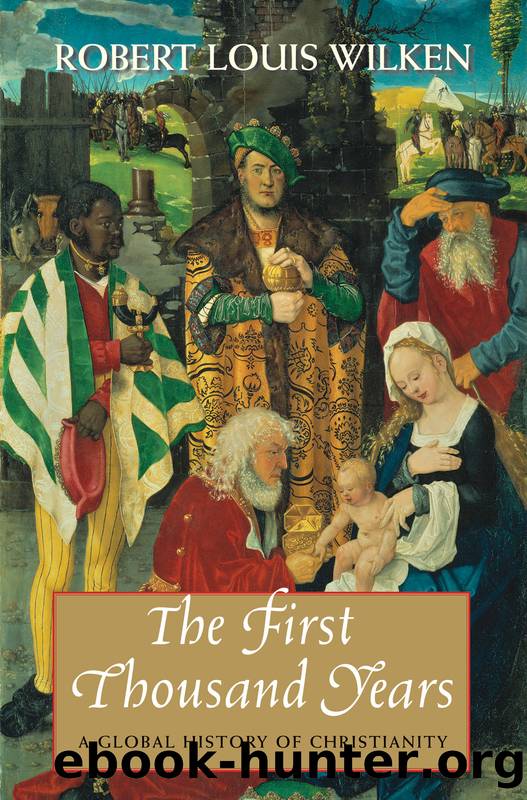The First Thousand Years by Robert Louis Wilken

Author:Robert Louis Wilken [Wilken, Robert Louis]
Language: eng
Format: epub
ISBN: 9780300188981
Publisher: Yale University Press
Published: 2012-06-15T04:00:00+00:00
20
The Great Controversy over Christ
Eloquence without wisdom is hazardous. In 428 a famous preacher from Syria named Nestorius was consecrated patriarch of Constantinople. Though fluent of speech, he lacked prudence and soon found himself at odds with the imperial family and monks in the city. The misstep that sparked his troubles was a sermon preached by his private chaplain denouncing the use of the term theotokos, God-bearer, or mother of God, as a title for the Virgin Mary. Mary is but a woman, he said, and God cannot be born of a woman. In defending his presbyter, Nestorius preached a series of sermons that rankled the faithful. A more appropriate description, he said, would be Christotokos, mother of Christ. His remarks set off a furor in the city, and news of his sermon was soon spread abroad.
The epithet theotokos was an ancient and venerable term of honor for the Virgin Mary, well documented in early Christian prayers and Christian writers at least from the third century. Here, for example, is the text of a prayer from third-century Egypt:
To your protection we flee, holy Mother of God.
Do not despise our prayers in our needs,
But deliver us from all dangers,
Glorious and blessed Virgin.
Even though the expression theotokos carried no explicit doctrinal content, and therefore was used by bishops with differing views, Nestorius thought its pious sentiments disguised faulty theological ideas about the relation of Christ to God. Mary gave birth to a man, who was united with God, not to the divine Son of God. God cannot have a mother, he said.
Within weeks a copy of the controversial sermon had made its way to Alexandria. The patriarch at the time was Cyril, a native Egyptian born in 378 in a small town about seventy miles east of Alexandria. His mother was the sister of Theophilus, who had served as secretary to Athanasius, the stalwart defender of the Council of Nicaea in mid fourth century. When Theophilus became bishop of Alexandria in 385 he took Cyril under his wing, preparing him for clerical office. Later Cyril wrote that from his youth he had been immersed in the Scriptures, and many of his mature writings are commentaries on biblical books, the Pentateuch, Isaiah, the Minor Prophets, the Gospel of John, the epistles of Saint Paul. In 403, he accompanied his uncle Theophilus as secretary to a synod in Constantinople at which John Chrysostom, the bishop of the city, was deposed. He served his uncle for nine years, during which time he learned the art of politics and was able to observe the skills of a wily and pugnacious polemicist. Theophilus was known as the Egyptian Pharaoh, and Cyril proved as redoubtable in governing the Church in Egypt as he was formidable in argument and debate. He was, in the words of a British scholar, one of those âstrong characters that excite the animosity of less successful controversialists.â He became bishop of Alexandria in 412.
The debate between Cyril and Nestorius centered on the interpretation of the Scriptures.
Download
This site does not store any files on its server. We only index and link to content provided by other sites. Please contact the content providers to delete copyright contents if any and email us, we'll remove relevant links or contents immediately.
Getting It, Then Getting Along by L. Reynolds Andiric(655)
Religion and Politics Beyond the Culture Wars : New Directions in a Divided America by Darren Dochuk(575)
Global Justice, Christology and Christian Ethics by Lisa Sowle Cahill(429)
Positive Psychology in Christian Perspective: Foundations, Concepts, and Applications by Charles Hackney(355)
Forgiveness and Christian Ethics by Unknown(349)
Douglas Hamp The First Six Days by Unknown(296)
The Horrors and Absurdities of Religion by Arthur Schopenhauer(271)
Insurgency, Counter-insurgency and Policing in Centre-West Mexico, 1926-1929 by Mark Lawrence(266)
Middle Eastern Minorities: The Impact of the Arab Spring by Ibrahim Zabad(250)
Christian Martyrdom and Christian Violence by Matthew D. Lundberg;(242)
Beyond Heaven and Earth by Gabriel Levy(236)
The Oxford Handbook of Greek and Roman Mythography by R. Scott Smith;Stephen M. Trzaskoma;(235)
God and Eros by Patterson Colin;Sweeney Conor;(230)
The Bloomsbury Reader in Christian-Muslim Relations, 600-1500 by David Thomas;(223)
Autobiography, Volume 2: 1937-1960, Exile's Odyssey by Mircea Eliade(216)
Witches: the history of a persecution by Nigel Cawthorne(211)
Cult Trip by Anke Richter(210)
An Introduction to Kierkegaard by Peter Vardy(201)
The Global Repositioning of Japanese Religions by Ugo Dessi(196)
